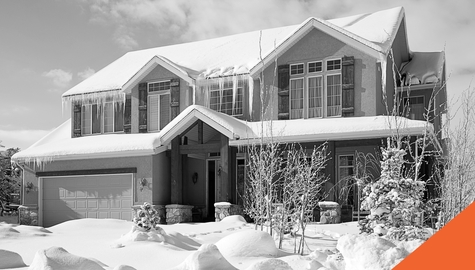The Importance of Replacing Your Roof
Tuesday, 17 September 2024
There’s nothing more important than having a roof over your head, food on your table, and a place to call home - which is why you should know that like all parts of a home, roofs will eventually need to be replaced.
Even the most well-constructed roofs have a finite lifespan, and putting off a replacement can lead to a host of problems: structural damage, decreased energy efficiency, and even higher insurance premiums. According to the International Association of Certified Home Inspectors, a roof's life expectancy is 20 to more than 100 years, depending on the materials being used.
Let’s explore why replacing your roof is vital, focusing on key benefits such as preventing water damage and mold, maintaining your home’s value, improving energy efficiency, and potentially lowering insurance costs.
1. Preventing Water Damage and Mold
One of the most critical reasons to replace an aging or damaged roof is to prevent water damage and mold growth. Over time, roofing materials like shingles, tiles, and underlayment can deteriorate, leading to leaks that allow water to seep into your home.
Water damage can be incredibly destructive, causing rot in wooden structures, weakening ceilings, and damaging insulation. If left unaddressed, leaks can lead to extensive repairs that are much more costly than a roof replacement.
Additionally, water intrusion creates the perfect environment for mold and mildew to thrive. Mold not only damages your home’s structure but can also pose significant health risks to your family, including respiratory issues, allergies, and other serious health problems.
By replacing your roof before leaks become a problem, you can prevent these issues from ever occurring, keeping your home safe and healthy.
Regular inspections can help identify early signs of water damage. Make sure to keep a careful eye out for water stains on ceilings, damp spots in the attic, or missing or curling shingles. If your roof is nearing the end of its lifespan or shows signs of damage, replacing it promptly can save you from the headaches and expenses associated with water damage and mold remediation.
2. Maintaining Home Value: Curb Appeal and Structural Integrity
Your roof plays a significant role in your home’s curb appeal and overall market value. A well-maintained roof not only makes your home look more attractive but also signals to potential buyers that the property has been well cared for. Conversely, a worn-out, damaged, or outdated roof can significantly detract from your home’s appearance, making it less appealing to buyers and potentially lowering your home’s market value.
Beyond aesthetics, the roof is also a critical component of your home’s structural integrity. It provides essential support to your home’s overall structure, protecting it from weather-related damage.
An old or failing roof can compromise the integrity of your entire home, leading to sagging or even collapse in extreme cases. By replacing your roof, you help maintain the structural soundness of your home, preserving its value and ensuring it remains safe and secure for years to come.
Moreover, investing in a new roof can yield a high return on investment. Many homeowners recoup a significant portion of the cost of a new roof when they sell their home, making it a smart financial decision in addition to a necessary maintenance task.
3. Improving Energy Efficiency
Replacing your roof isn’t just about keeping water out - it’s also an opportunity to enhance your home’s energy efficiency. Modern roofing materials are designed with energy efficiency in mind, offering better insulation and ventilation compared to older materials.
A new roof can help regulate your home’s temperature more effectively, reducing the load on your heating and cooling systems and potentially lowering your energy bills.
Additionally, improved insulation is a key benefit of many modern roofing systems. By keeping warm air inside during the winter and cool air inside during the summer, a well-insulated roof helps maintain a consistent indoor temperature, reducing the need for constant heating or cooling. This not only makes your home more comfortable but also cuts down on energy costs, saving you money in the long run.
Finally, proper ventilation is another critical aspect of an energy-efficient roof. Good ventilation prevents the buildup of heat in your attic, which can lead to higher cooling costs in the summer. It also helps prevent moisture accumulation, reducing the risk of mold and rot.
When replacing your roof, consider upgrading to materials that offer better insulation and ventilation options, such as cool roofing materials or reflective shingles, to maximize energy savings and improve your home’s overall efficiency.
4. Lowering Insurance Premiums
Another often-overlooked benefit of replacing your roof is the potential for lower home insurance premiums. Many insurance companies offer discounts for homes with newer roofs, as they pose a reduced risk of damage from storms, leaks, and other potential hazards.
A new roof is more resilient and better able to withstand severe weather conditions, reducing the likelihood of filing claims for weather-related damage.
For instance, installing a roof with impact-resistant materials can protect your home from hail damage, a common issue in many regions. Similarly, roofs made of fire-resistant materials can reduce the risk of fire damage, which might also lead to lower insurance costs. By investing in a high-quality, durable roof, you not only protect your home but also demonstrate to your insurer that you are taking proactive steps to minimize risks, which can translate to savings on your insurance premiums.
It’s worth discussing with your insurance provider to understand what types of roofing materials and upgrades can qualify for discounts. In some cases, the savings on your premiums can help offset the cost of a new roof over time, making it a financially savvy decision.
Additional Considerations When Replacing Your Roof
While the benefits of replacing your roof are clear, it’s also important to approach the process thoughtfully. Here are a few additional considerations to keep in mind:
Choose the Right Materials
Not all roofing materials are created equal. Consider the climate in your area, the architectural style of your home, and your budget when selecting materials. Options include asphalt shingles, metal roofing, clay tiles, and more, each with its own set of benefits and drawbacks.
Hire a Reputable Contractor
The quality of your roof replacement will largely depend on the expertise of the contractor you hire. Look for licensed, insured, and experienced roofing professionals with good reviews and a strong track record in your community.
Consider Timing
Roof replacements are best done during fair weather to avoid delays and complications. Plan your project for a season with stable weather conditions to ensure the job is completed efficiently and effectively.
Think About Long-Term Maintenance
Even with a new roof, regular maintenance is key to prolonging its lifespan. Keep gutters clean, inspect your roof regularly, and address minor issues before they become major problems.
Replacing your roof is a critical investment in the safety, value, and efficiency of your home. By preventing water damage and mold, maintaining your home’s structural integrity, improving energy efficiency, and potentially lowering insurance premiums, a new roof offers numerous benefits that extend beyond mere aesthetics.
While it may seem like a daunting expense, the long-term savings, enhanced comfort, and increased home value make it a worthwhile endeavour. If your roof is showing signs of age or damage, don’t wait - start exploring your options today and take the first step toward a safer, more efficient, and more valuable home.
How Do I Get Home Insurance With Billyard Insurance Group?
You can begin by filling out our online quote form for your home insurance with Billyard Insurance Group. We will shop the marketplace for you to find the most suitable home insurance company offering the coverage you need at the best possible price we can find. You can also contact your nearest BIG branch to discuss your home insurance options with one of our insurance experts.



